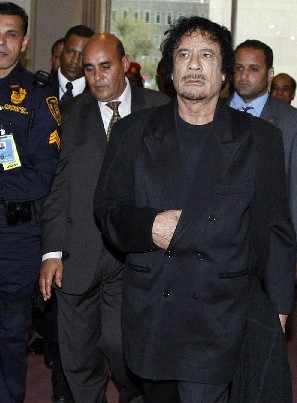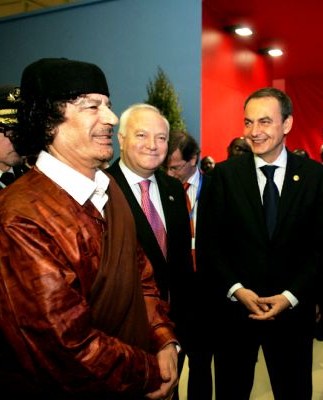|
Libya | World Politics EU forgives Gaddafi, Africa still angered
The diplomatic row between Libya and Western states - ignited by the imprisonment of Mr Gadaffi's son in Switzerland and a later Swiss blacklisting of Libyan officials in the EU's common travel visa system - was threatening to undermine years of painfully achieved normal ties with Libya. Even the US was getting dragged into the crisis after an official had criticised Mr Gaddafi's call for "jihad against Switzerland".
The discussion about Mr Gaddafi's split-Nigeria proposal is still ongoing all over Africa. And the reactions mainly agree that Africa should stop listening to the "mad man" from Libya. The loss of reputation experienced by the Libyan leader in Africa will be a major setback for years. But the Libyan leader has the mouth where the money is. He loves giant projects and rewards cordial ties with the possibilities of almost unlimited investment and profit possibilities. Currently, the Chinese and Russians are involved in billion dollar railway projects, while US and EU companies have been given billion dollar investment opportunities in the oil and gas industry. This is also the case for Africa. Mr Gaddafi is fond of giant African infrastructure projects - especially if they link Libya with other countries - and can be talked into investing large sums if given honourable positions such as the AU presidency or being received like a major leader. Since the mid-1990s, Africa has been a major foreign policy pillar in Tripoli. Colonel Gaddafi has invested large sums in gaining African allies. With the establishment in 1998 of the Tripoli-based Community of Sahel-Saharan States (CEN-SAD), an estimated US$ 300-400 million have been channelled from Libya to friendly African countries. Also, the Libyan leader has a strong political position in Africa, being engaged in several wars and peace processes. While previously occupying northern Chad, funding rebels in Sierra Leone and Liberia and being engaged in West Africa's illicit blood diamond trade, Libya is now marketing itself as a necessary peace mediator. Tripoli was able to play a key role in preventing a full-scale war between Chad and Sudan a few years ago. Libya, having ties to both governments and armed rebels, has plaid an important role in negotiating more or less stable peace agreements within Sudan, Chad and the Central African Republic. But analysts hold that Libya's high star on the African continent is becoming bleaker. "Gaddafi's efforts in Chad have only partially helped him to improve his image internationally and have, in fact, reinforced the view that Libyan foreign policy remains contradictory," according to a new analysis by the Brussels think-tank International Crisis Group (ICG). "Libya's diplomatic successes in Chad have been short-lived, due to a lack of focus on longer-term reforms and its difficulty in tolerating the contributions of other regional or wider international players in its quest to dominate its neighbourhood," according to the ICG analysis. Together with the Libyan leader's split-Nigeria affair, the lessening influence in the Sahel region may ease other African leaders' desire to distance themselves from the "mad man" initiatives of Mr Gaddafi. Unless the Libyan leader again opens his check-book, of course. By staff writers © afrol News - Create an e-mail alert for Libya news - Create an e-mail alert for World news - Create an e-mail alert for Politics news
On the Afrol News front page now
|
front page
| news
| countries
| archive
| currencies
| news alerts login
| about afrol News
| contact
| advertise
| español
©
afrol News.
Reproducing or buying afrol News' articles.
You can contact us at mail@afrol.com









